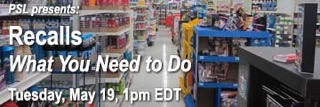|
  
|
|
|
Monday April 06, 2015
CPSC Magnet Rule Stayed by 10th Circuit; CPSC Files Post-Hearing Argument By Sean Oberle
By Sean Oberle
CPSC has a deadline of April 14 to respond to a temporary stay of its magnets rule. The April 1 order came the day the rule went into effect. It was at the request of Zen Magnets in the 10th Circuit Court of Appeals before Judges Paul Kelly and Harris Hartz.
The company stated, “It’s far from time to post the ‘Mission Accomplished’ banner, but this is a tangible indicator of momentum.” Moreover, Zen’s continued sale of the affected products is uncertain. Its website contains numerous notices that they are not available, and its statement following the stay order explained that the legal uncertainties make it and other companies cautious about investing in large quantities. Thus, Zen explained, if it does import magnet sets, the volume is likely to be low. “We simply cannot risk driving full speed in the dark without knowing if a wall lies ahead,” it wrote.
The rule (PSL, 9/29/14) bans sets of small magnets, typically sold as amusements, with flux indexes over 50. It passed 4-0, with Commissioner Ann Marie Buerkle recusing herself (PSL, 9/14/14) over concerns that CPSC was pursuing separate legal action related to the products.
That other situation is the administrative suit – with Zen as the only remaining defendant – seeking to force recalls of already-sold units. Administrative Law Judge Dean Metry heard the sides late last year, but a ruling has not been announced.
An indicator of the potential timing of that ruling was CPSC’s April 2 filing of its post hearing arguments before Metry. CPSC lawyers contended that magnet sets should be recalled “because they (1) fail to comply with an applicable consumer product safety rule under the CPSA, which creates a substantial risk of injury to the public, and (2) contain a product defect which creates a substantial risk of injury to the public.”
The agency’s arguments included insisting the magnet sets are toys, not science or hobby kits. It argued that not only is their use “appealing to and engaged in by children under 14,” but they also have been marketed to that age group.
CPSC’s evidence included emails from Zen founder Shihan Qu. It alleged, “Mr. Qu exchanged email with middle school children, encouraging use of the Subject Products as jewelry, and admitted that Zen Magnets are appropriately used as ‘play jewelry.’” The agency further alleged that Zen sponsored contests that involved the building of product characters that are appealing to children younger than 14. It emphasized that children as young as 7 have won them. As well, CPSC pointed to statements and warnings by Zen as undermining of the view that children under 14 should not use the products.
CPSC also argued that efforts to restrict sales by age have been ineffective, including retailers not verifying ages of buyers, not giving verbal warnings about the risks to children, and showing the products when customers asked to see “toys.”
CPSC further argued that the products are substantial hazards because the risk “occurs as a result of their operation or use”; that warnings “do not and cannot mitigate the risk”; and that they are defective because they have limited utility, are a risk by their nature, are not a necessity, the population exposed is at risk of severe injury, the risk is not obvious, warnings and instructions are inadequate, foreseeable consumer misuse exists, commission experts agree, and case law is supportive.
CPSC also reviewed the pattern of defect, numbers of products already in commerce, and the severity of risk in supporting its view that the magnet sets are substantial hazards.
Read CPSC's slightly redacted argument at www.cpsc.gov//Global/Recalls/Recall-Lawsuits/PostHearingArgumentRedacted.pdf.
|

